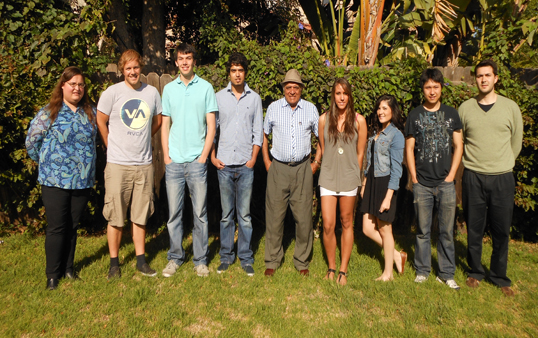Wiping Out Poverty: Global Income Convergence Group
Envision a world where there are no rich or poor countries, and poverty is wiped out. That’s what Economics Professor Dr. Nake M. Kamrany’s “Global Income Convergence Group (GIC-G),” including twelve USC undergraduates and a PhD scholar from the Netherlands, propose can happen in the future.

GIC-G’s findings show that there are about thirty-eight developing countries that will become rich due to a phenomenon known as global income convergence. Essentially, per capita income will be the same internationally, and equal opportunities and resources will be available to everyone, regardless of where they were born.
Group members research issues, such as war costs, violence, health care, high incarceration rates, and renewable energy in order to achieve global income convergence.
GIC-G fosters one-of-a-kind research collaboration between faculty and USC undergraduates from all over the world.
“You find me one faculty who has co-published with twelve undergraduate students in one year,” Dr. Kamrany stated.
The group is shedding light on the accomplishments of the faculty and students in Dornsife's Economic Department. It has grown from a few students working on individual projects to a unified team of published researchers.
Last Saturday, Jessica Greenhalgh (Junior, Economics and Biological Science Major) co-published the most recent article with Dr. Kamrany, “An Optimal Solution to U.S. Health Care.”
Her research is expected to create quite a public reaction. In order to form a national health care plan that provides all citizens with health care, she advises cutting physician’s salaries and having people pay an additional tax towards health care based on income level.
She also points out the high cost and ineffectiveness of Obama’s health care plan.
“I would completely get rid of Obama’s health care plan. It is a plan for reform, not insurance that will benefit everyone. He is telling people they have to use an insurance plan to get health care and people who cannot afford insurance will be fined,” Greenhalgh commented.
Faiyaz Azim (Freshman, Economics Major) published, “Bangladesh’s Rising Income Potential,” which he co-wrote with Dr. Kamrany and Jessica Stauffer, another USC student.
He was inspired to join the group after engaging in a friendly debate with Dr. Kamrany about Bangladesh’s potential for income convergence.
“At first, I disagreed with Dr. Kamrany. Bangladesh cannot converge with the U.S., because it has so many natural disasters and corruption in the government. I think the leadership is leading the country in the wrong direction. But now Dr. Kamrany kind of convinced me they can,” Azim said.
The group also incorporates their experiences abroad to their research. Jennifer Gray (Junior, Economics Major) will travel to Botswana in May through Marshall ExCEL to see first-hand how Botswana can improve its economy and converge with rich countries.
“How is Botswana not being promoted as the poster child for Africa? They’re Africa's number one least corrupt country,” Gray said.
She projects that Botswana will converge in 2036 if their economy slowly weans off its dependence on the diamond industry. During her trip, her goal is to find other industries that will contribute to Botswana's economy and publish another article with her predictions and solutions for Botswana’s continued growth.
Danielle Ramirez (Junior, Economics Major) co-wrote an article with Dr. Kamrany in January 2011 that gained international attention. Soon afterwards, the Routledge Publishing Company in the U.K. offered to publish a chapter of Dr. Kamrany and her work.
Vincent Viruni (Freshman, Economics Major) shared his research on sustainability for the U.S. and how shifting to renewable energy will help global income convergence.
“Renewable energy is like a child. If you let the child run out on the street, it won’t know what to do. The government needs to guard this child against huge fuel corporations. The problem is that we need affordable and alternative energy. The cost of renewable energy is high and fossil fuel is low. The government needs to draw a line about how far renewable energy and fuel corporations should collaborate,” Viruni explained.
“The old thinking is that your opportunities to succeed are dependent upon where you were born. The new thinking is that wherever you were born, you will have access to the same opportunities in life,” Dr. Kamrany asserted.
You can read more scholarly articles co-written by talented GIC-G members on the Huffington Post.
RELATED:










